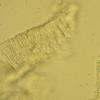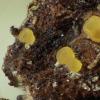
07-02-2023 22:28
Ethan CrensonHello friends, On Sunday, in the southern part of

19-02-2026 17:49
Salvador Emilio JoseHola buenas tardes!! Necesito ayuda para la ident

19-02-2026 13:50
Margot en Geert VullingsWe found this collection on deciduous wood on 7-2-

16-02-2026 21:25
 Andreas Millinger
Andreas Millinger
Good evening,failed to find an idea for this fungu

08-12-2025 17:37
 Lothar Krieglsteiner
Lothar Krieglsteiner
20.6.25, on branch of Abies infected and thickened

17-02-2026 17:26
 Nicolas Suberbielle
Nicolas Suberbielle
Bonjour à tous, Je recherche cette publication :
discomycete on wood with distinct margin
Kosonen Timo,
24-03-2015 12:19
 Hello, Salut!
Hello, Salut!I joined the forum two months ago and since then, I've waited for a good pretense to say "Hello everybody". In the good care of Karen Hansen (Riksmuseet, Stockholm) and Seppo Huhtinen (Herbarium, University of Turku) I hope to give some more light to the systematics of Hyaloscyphaceae (s.l).
We are mainly collecting in Scandinavia (especially Sweden) and since we are primarily interested in fresh material (vital taxonomy, cultures) and with only four years for this, there is, with certainty, a lot of interesting material we never come across in the field. But they might show up here. For example:
http://www.ascofrance.fr/forum?id=33275
Should you post a similar "strange" collection, beware of a politely formulated request for a duplicate. Postal expenses covered of course and any taxonomic novelties would be published in co-operation with the collector.
Now, we recently came across this lignicolous discomycete. It's young, no asci observed. No hairs either. The margin however appears peculiar, is it enough to define the genus? Maybe Orbiliomycetes and not a Helotiales at all?
A lovely forum this is,
Timo Kosonen
Turku Herbarium
Hans-Otto Baral,
24-03-2015 12:29

Re : discomycete on wood with distinct margin
Dear Timo
welcome to the forum!
And you are on the right track, it is a Hyalorbilia, characterizd by a textura prismatica and sessile asci with croziers, paraphyses covered by a continuous often warted exudate.
It looks immature indeed, and species recognition is difficult in that genus. I think the season did not yet start for these larger representatives of the genus. I assume you found it on substrate on the moist ground. Those on attached branches occur more throughout the year.
Zotto
welcome to the forum!
And you are on the right track, it is a Hyalorbilia, characterizd by a textura prismatica and sessile asci with croziers, paraphyses covered by a continuous often warted exudate.
It looks immature indeed, and species recognition is difficult in that genus. I think the season did not yet start for these larger representatives of the genus. I assume you found it on substrate on the moist ground. Those on attached branches occur more throughout the year.
Zotto
Andreas Gminder,
24-03-2015 12:30

Re : discomycete on wood with distinct margin
Hello and welcome to the forum!
In my opinion, the agglutinated hymenium layer points to Orbilia/Hyalorbilia.
best regards,
Andreas
Kosonen Timo,
25-03-2015 10:58

Re : discomycete on wood with distinct margin
Allright,
This Hyalorbilia was indeed found from wood on moist ground. Often there is a decent snow cover even here in SW-Finland until mid-March. January and February were record-breaking mild. There was even a period of temperature being 24h above 0 C degrees - for a week or so in the end of February. Now the nights are cold again and sun and wind are drying the terrain. But it appears many ascos and some basiodiomycetes as well got a very early start. Here are some observations from February 25th to March 23th. I've mainly went through semi-urban "bushes", with Quercus, Acer, Alnus, Betula, Salix and some piles of shrubs.
Excluding Mollisia, Olla transiens is one of the most often collected discomycete. The clearly resinous ones I now even dare to leave uncollected. Only one observation of Olla millepunctata, with mature or over mature fruitbodies (but ok spores)– maybe it was already there in 2014? Some interesting Cistella, the common(?) dentata and then something unidentified, with dense septa in hymenia. Some "Lachnums" are up too. Lachnum virgineum's been spotted a few times, Capitotricha bicolor once and then Trichopeziza subsulphureum from a Acer stump, a previously unreported species in Finland. Not that many Hyaloscypha-species, only vitreola so far and aureliella on the occasional coniferous wood. And then slightly off-topic, Merismodes anomalus appears to have a very prominent spring peak as well as many Dacrymyces-species.
Winter has been mild, but still, the ground has been frozen from December to February. Are discomycetes really this dynamic or are we talking about real phenology here? All comments are wellcome.
Timo
This Hyalorbilia was indeed found from wood on moist ground. Often there is a decent snow cover even here in SW-Finland until mid-March. January and February were record-breaking mild. There was even a period of temperature being 24h above 0 C degrees - for a week or so in the end of February. Now the nights are cold again and sun and wind are drying the terrain. But it appears many ascos and some basiodiomycetes as well got a very early start. Here are some observations from February 25th to March 23th. I've mainly went through semi-urban "bushes", with Quercus, Acer, Alnus, Betula, Salix and some piles of shrubs.
Excluding Mollisia, Olla transiens is one of the most often collected discomycete. The clearly resinous ones I now even dare to leave uncollected. Only one observation of Olla millepunctata, with mature or over mature fruitbodies (but ok spores)– maybe it was already there in 2014? Some interesting Cistella, the common(?) dentata and then something unidentified, with dense septa in hymenia. Some "Lachnums" are up too. Lachnum virgineum's been spotted a few times, Capitotricha bicolor once and then Trichopeziza subsulphureum from a Acer stump, a previously unreported species in Finland. Not that many Hyaloscypha-species, only vitreola so far and aureliella on the occasional coniferous wood. And then slightly off-topic, Merismodes anomalus appears to have a very prominent spring peak as well as many Dacrymyces-species.
Winter has been mild, but still, the ground has been frozen from December to February. Are discomycetes really this dynamic or are we talking about real phenology here? All comments are wellcome.
Timo
Hans-Otto Baral,
25-03-2015 11:39

Re : discomycete on wood with distinct margin
Difficult to say. Some are probably quite restricted, especially parasites like Ciboria amentacea. Drought-tolerant ones are quite independent from the season. And sometimes spring fungi occur in autumn again....
Stip Helleman,
25-03-2015 23:47

Re : discomycete on wood with distinct margin
Dear Timo,
welcome to the forum.
When there is still (melting) snow seems to provide a good environment for apothecial development in Hyaloscyphaceae, in Branch heaps or on leaves. A good cover for frost and wind.
I wish you good luck with your aim to shine more light on Hyaloscyphaceae s.l. systematics in 4 years.
cheers,
Stip
welcome to the forum.
When there is still (melting) snow seems to provide a good environment for apothecial development in Hyaloscyphaceae, in Branch heaps or on leaves. A good cover for frost and wind.
I wish you good luck with your aim to shine more light on Hyaloscyphaceae s.l. systematics in 4 years.
cheers,
Stip


